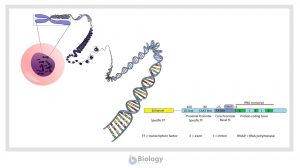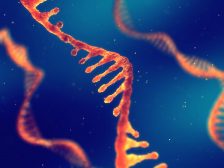Definition
noun, plural: DNA polymerases
(molecular biology) An enzyme assisting in DNA replication
Supplement
Polymerases are enzymes that assist in synthesizing long chains of nucleic acids. There are DNA polymerases and RNA polymerases. DNA polymerases are those that are involved in template-directed synthesis of DNA from deoxyribonucleotide triphosphates. They are used to assemble DNA molecules by copying a template strand of DNA according to base-pairing interactions. They usually work in pairs so that two new identical strands of DNA are produced from a single strand of the parent DNA molecule. Another group of enzymes called helicases are also involved during the process of DNA replication. The helicase unwinds the DNA molecule resulting in a replication fork, thus, allowing the DNA polymerases to read the strands for use as templates. DNA polymerases add free nucleotides to the 3′ end of the newly forming strand. As a result, the new strand elongates in a 5’ 3′ direction.
Examples of DNA polymerases in prokaryotes are as follows: DNA polymerase I, DNA polymerase II, DNA polymerase III, DNA polymerase IV, and DNA polymerase V. DNA polymerases I, II, and III are known in E. coli.. DNA polymerase III appears to be most important in genome replication. DNA polymerase I is important for its ability to edit out unpaired bases at the end of growing strands. Retroviruses possess a unique DNA polymerase, i.e. reverse transcriptase, which uses RNA template to synthesize DNA.
As for eukaryotes, examples of DNA polymerases are Polymerases α, β, λ, γ, σ, μ, δ, ε, η, ι, κ, ζ, θ and Rev1. Animal cells have DNA polymerases that are responsible for the replication of DNA in nucleus and mitochondria.
See also:
Dictionary > DNA polymerase




